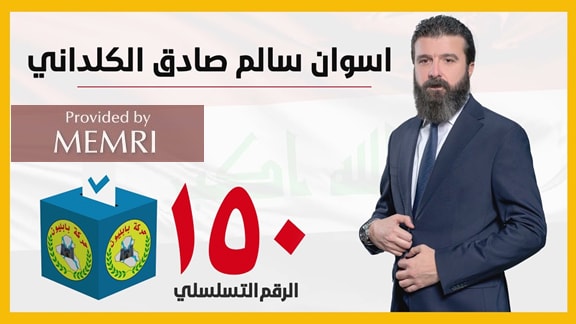
Christian Aswan Salim of the Iran-aligned Babylon Movement running for re-election in Iraq
Iraq is scheduled to go to the polls on October 10, electing a new House of Representatives that will then choose a prime minister. These will be the first elections since popular demonstrations roiled the country beginning in October 2019. Government and militia death squad repression of those demonstrations killed hundreds of young people with little to no accountability. Demonstrators were able to bring about the fall of Prime Minister Abdul Mahdi but most demands were not met.
The mood for political change in Iraq seems muted today, reforms never really happened, and some opposition groups of demonstrators have called for a boycott of what they see as flawed elections while other reformists have cautioned that there is no substitute for voter participation.[1] Some things seem assured, that Prime Minister Mustafa Al-Kadhimi will likely remain in the office he has held since May 2020, and that Shia political parties and militias allied to Iran will do well and maintain their positions of power.[2] Continuity rather than radical change seems the expected outcome in an Iraq facing multiple challenges. If domestic reform ever actually does come, it will do so in measured and incremental terms.
One of the dismaying results of the previous 2018 elections – at least for one small part of the Iraqi electorate – was the intromission of pro-Iranian militias into the small number of quota seats set aside for Iraq's Christian minority (nine out of the 329 seats in Iraq's parliament are set aside for minorities, five of those for Christians). In a shocking development two of the five Christian seats went to members connected with the "Babylon Movement," the political branch of an ostensibly Iraqi Christian militia (most of the militia's members are non-Christians), the "Babylon Brigade," aligned with the Iranian-controlled militias and parties that wield so much power in Iraq.
The problem of "hijacking minority seats" is an obvious one.[3] Christian candidates are voted on, not only by members of that minority group but by Iraqi voters nationally so that the pro-Iranian Shia parties can flood these candidacies with outside votes choosing individuals beholden to them, not to the Christian community. The Babylon Movement has negligible Christian support, but can count on thousands of votes harvested elsewhere. Other candidates run in 83 individual districts but the minority seats are open to votes nationwide, so a candidate in Nineveh province, where many of the country's remaining Christians live, can be elected with thousands of votes from Shia Muslim areas where there are no local Christian communities. It is an electoral loophole abused by sectarian militias that has not been closed by Iraq's deputies.
The Babylon Movement is running candidates for each of Iraq's five Christian slots.[4] Three of the five are (unveiled) Christian women while the top vote getter is expected to once again be incumbent Aswan Salim Sadiq Al-Kaldani, the brother of Babylon Movement's Secretary General Rayan Al-Kaldani, who was sanctioned by the U.S. Treasury Department in 2019 for "serious human rights abuse and corruption."[5] 30 other candidates, from traditional Assyrian and Chaldean parties and alliances plus independents, are competing for the five seats.
Babylon Movement/Brigade leader Rayan Al-Kaldani
The propaganda associated with Babylon and Rayan Al-Kaldani is fascinating to watch, playing as it does on imagery of Christian identity, Iraqi nationalism, and military prowess.[6] There are multiple videos (admittedly with rather scanty views) of him dressed as a warrior surrounded by fighters, or photobombing unsuspecting nuns and documenting attendance at Mass.[7] Much of the imagery is misleading, as when Al-Kaldani tried to get himself photographed with a visiting Pope Francis earlier this year.[8] The party's other parliamentarian, Baida Khidr Behnam, was actually able to place a pin with the logo of the Babylon Movement and the Iraqi flag on the unsuspecting Holy Father.[9]
Al-Kaldani, fervently and openly pro-Iran, ostensibly heads both the party and the militia. The Babylon Brigade, founded in 2014, makes up the 50th Brigade of Iraq's Popular Mobilization Forces (PMF). In a 2015 video circulated by the sectarian Imam Mahdi Media on YouTube, Al-Kaldani offered at the time to go "fight ISIS" in Syria and Yemen as well.[10] Most of the unit's fighters are Shia Muslims from Sadr City or Southern Iraq. The unit was involved in corruption and abuse of the local Christian population when stationed in the Nineveh Plain region.[11]
SUPPORT OUR WORK

The rise of political tokenism in the election of Iraqi Christian representatives is only one element in the ongoing marginalization of Iraq's non-Muslim minority groups. Majority pressure on property and land held by these minorities continues to be a problem, whether in Baghdad or even in the Nineveh Plain area that contains a significant element of the country's remaining Christian and Yazidi population. Actual larceny only compounds the political theft at the ballot box. It is as if what little these communities, who were targeted so brutally by ISIS in 2014, have is to be taken away from them.[12] And all this only compounds the powerful temptation to emigrate to less inhospitable climes in the West.

Iranian directed Babylon Movement five candidates for the October 2021 Elections
Chaldean Catholic Patriarch Louis Sako expressed his concern in July that Christians may not vote because they were "robbed" during the last election when their representation was "hijacked."[13] "Babylon" doing well in the next Iraqi elections and either keeping or increasing its number of deputies will certainly dishearten those who wish for there to be truly independent Christian voices speaking up for this ancient if much-battered community in their historic homeland. And the ramifications of the Babylon model have consequences elsewhere. Iran, of course, has bankrolled proxy militias drawn from Afghan and Pakistani Shia to fight in Syria, supports Sunni Islamists in Gaza, and in Iraq has Yazidi and Shabak units in addition to its "Christian" militia.
But the biggest regional application of the Babylon model beyond Iraq will likely be in politics in Lebanon. As its Christian population flees from the disastrous rule of the country's mafia-like predatory elite (including its Maronite President Michel Aoun), the percentage of Lebanese Christians will eventually fall beneath a critical mass where electoral districts will become demographically unrepresentative. It is then, perhaps in only one generation, when Christian deputies will be chosen directly by the votes of sectarian parties like Hizbullah. One might note that in a way this has already happened given that Aoun's Free Patriotic Movement (FPM) party is closely allied to Hizbullah but it can get worse. And atomized remnant communities placing a Christian (or other minority) face on harshly sectarian rule by Iranian proxies in Lebanon or Iraq is the last stop on a road toward extinction.
*Alberto M. Fernandez is Vice President of MEMRI.
[1] Al-monitor.com/originals/2021/09/iraqi-protest-groups-will-sit-out-october-elections, September 8, 2021.
[2] Amwaj.media/article/the-inside-story-of-how-kadhimi-is-securing-another-term, September 28, 2021.
[3] Rudaw.net/english/middleeast/iraq/220920214, September 22, 2021.
[4] Youtube.com/watch?v=SxCMEFHqAcs, September 1, 2021.
[5] Home.treasury.gov/news/press-releases/sm735, July 18, 2019.
[6] Youtube.com/watch?v=Ac2avCo3HRM, July 1, 2021.
[7] Youtube.com/watch?v=3Emuao51e_Q, June 4, 2021.
[8] Youtube.com/watch?v=65rzpmZIprY, May 27, 2021.
[9] Ashourland.net/2021/03/07/%D9%85%D9%85%D8%AB%D9%84%D8%A9-%D8%AD%D8%B1%D9%83%D8%A9-%D8%A8%D8%A7%D8%A8%D9%84%D9%8A%D9%88%D9%86-%D8%A7%D9%84%D9%86%D8%A7%D8%A6%D8%A8%D8%A9-%D8%A8%D9%8A%D8%AF%D8%A7%D8%A1-%D8%AE%D8%B6%D8%B1-%D8%AA, July 3, 2021.
[10] Youtube.com/watch?v=pp2RsY1uGRY, June 17, 2015.
[11] Washingtoninstitute.org/policy-analysis/normalizing-security-nineveh-plains, July 9, 2019.
[12] Sotaliraq.com/2021/09/23/%d8%a7%d9%84%d8%b5%d8%b1%d8%a7%d8%b9%d8%a7%d8%aa-%d8%a7%d9%84%d8%ad%d8%b2%d8%a8%d9%8a%d8%a9-%d8%b9%d9%84%d9%89-%d9%85%d9%82%d8%a7%d8%b9%d8%af-%d8%a7%d9%84%d8%b3%d9%84%d8%b7%d8%a9-%d9%85%d8%ae%d8%a7, September 23, 2021.
[13] Fides.org/en/news/70555-ASIA_IRAQ_Chaldean_bishops_and_priests_on_upcoming_political_elections_faith_and_ecclesial_belonging_are_not_to_be_exploited_for_electoral_purposes, July 23, 2021.




